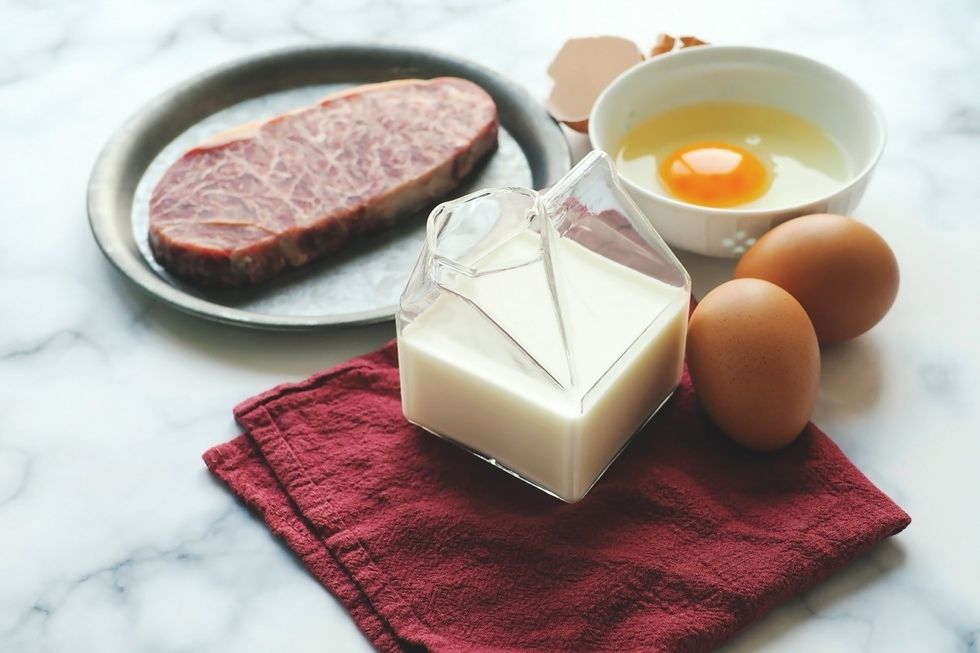Building a well-balanced diet isn’t exactly rocket science. We know that boxed meals, refined carbs, soda, and foods with added sugar and salt aren’t the best for our health. According to a 2023 study, diet patterns rich in whole grains, fruits, vegetables, nuts, and legumes boost longevity and can reduce your risk of chronic diseases, including death. However, if you love steak, taco meat, scrambled eggs, and barbecue chicken, then you’re probably curious about where protein factors into this equation. In a new HuffPost interview, doctors warned against animal-based protein, citing that a diet packed with meats, dairy, poultry, and eggs can actually “accelerate aging.”
RELATED: 112-Year-Old Woman Reveals What She Eats Every Day for Longevity (And What She Doesn’t Eat).
The U.S. Food and Drug Administration (FDA) generally recommends that adults aim to consume 50 grams of protein per day. To give you a visual, a single chicken breast is about 43 grams of protein; two eggs equates to 12 grams of protein; and an eight-ounce hamburger patty is about 25 grams of protein. For meat lovers, it feels like a super attainable goal—but it’s also an easy marker to surpass.
Albeit, what doctors are more concerned about is the type of protein you’re eating. Animal-based protein is arguably the most common (think: milk, eggs, chicken tenders, carne asada, etc.), but doctors stress that plant-based proteins (tofu, quinoa, chickpeas, and beans) are much healthier for you in the long run.
“A common mistake is the overemphasis on consuming a high-protein diet, particularly one rich in animal-based proteins, with the belief that it is essential for longevity and muscle preservation,” Monisha Bhanote, PhD, a quintuple-board-certified physician, told HuffPost. “Many people assume that the more protein they consume, the healthier they will be, leading to an overconsumption of animal products like meat, dairy and eggs.”
Bhanote explained that animal-based proteins contain advanced glycation end products (AGEs) and trimethylamine N-oxide (TMAO), two “harmful” compounds that can “accelerate aging and undermine cellular health” when consumed in “excessive” amounts.
Animal-based foods that are grilled, fried, or roasted are particularly high in AGEs.
RELATED: The 3 “Ultraprocessed” Foods You Must Avoid for a Longer Life, 30-Year Study Finds.
“AGEs are harmful compounds that form when proteins or fats combine with sugar in the bloodstream,” she continued. “AGEs damage proteins, DNA and other vital cellular structures, accelerating the aging process and contributing to chronic diseases like diabetes, cardiovascular disease and Alzheimer’s.”
As for TMAO, high levels of this harmful compound can create inflammation around the heart and, consequently, increase your risk of developing cardiovascular disease.
“TMAO promotes the accumulation of cholesterol in the arteries and impairs the body’s ability to remove it, leading to inflammation and further damage to the cardiovascular system. This not only compromises heart health but also affects overall cellular function and longevity,” added Bhanote.
For these reasons, it’s suggested that people up their plant-based protein intake. Adding chickpeas or nuts and seeds to a salad can increase fiber levels while also providing a healthy source of protein. Similarly, loading a burrito bowl with beans, lentils, tofu, or tempeh can be a healthier alternative to shredded chicken or red meat.
“These foods are naturally low in AGEs and do not contribute to TMAO production, making them much gentler on your cells and overall health,” explained Bhanote.
Of course, this isn’t to say that all animal-based proteins are bad for you. As with anything else, consuming meat, poultry, dairy, and eggs in moderation is perfectly fine. It’s when your protein intake is more than the daily recommended amount that you should reevaluate your diet.

